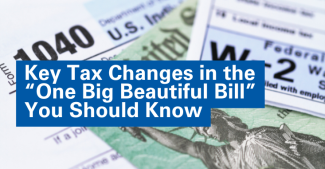
The One Big Beautiful Bill Just Passed. Here's What it Means for Your Financial Plan.
We’re here to help you cut through the noise and focus on what matters, especially when policy changes could impact your financial life.
The newly signed tax and spending legislation—dubbed the “One Big Beautiful Bill”—is one of those moments. At over 900 pages, the bill brings significant updates to the tax code and federal priorities. Here’s what you need to know:
A Closer Look at the New Tax Law
This law extends and expands several key provisions from the 2017 Tax Cuts and Jobs Act (TCJA), many of which were set to expire soon. Here are some of the most relevant updates that will impact the 2025 tax year and beyond:
- Federal tax brackets from the 2017 Tax Cuts and Jobs Act are now permanent.
- Standard deduction rises to $15,750 (individuals) and $31,500 (joint filers).
- SALT deduction cap increases to $40,000, rising 1% annually through 2029.
- New “senior bonus” adds a $6,000 per individual deduction for older Americans (income limits apply).
- Child tax credit increases to $2,200 per child, adjusted for inflation.
- Tip income deduction of up to $25,000 for workers earning under $150,000 (through 2028).
- Federal estate tax exemption rises to $15M per person ($30M per couple) in 2026.
Why This Matters for Your Financial Plan
One of the most meaningful takeaways is the removal of what many were calling the “tax cliff”—a sharp potential increase in taxes that was on the horizon had the TCJA provisions expired. With that uncertainty behind us, we’re able to plan more effectively for the future.
Today’s tax rates, while historically low, are now more predictable. This supports more confident planning when it comes to income strategies, Roth conversion opportunities, charitable giving, and more.
From an estate planning perspective, the expanded exemption levels mean fewer families will be subject to federal estate taxes. But as always, thoughtful planning remains essential, especially since some state-level estate taxes operate under much lower thresholds.
The Bigger Picture: Debt, Spending, and Market Impacts
While the tax provisions are largely favorable for households, they are part of a broader package that increases federal spending. The Congressional Budget Office estimates the bill will add more than $3 trillion to the national debt over the next decade.
From an investment standpoint, high debt levels may influence interest rates and inflation over time. Yet history reminds us that markets tend to adapt to these changes. Even amid rising debt and shifting policy environments, long-term investors have been rewarded for staying the course with diversified portfolios.
How We Move Forward, Together
Tax policy can influence your personal financial picture, but it rarely dictates long-term investment outcomes. Markets have thrived under a wide variety of tax laws and political climates. What endures is the power of discipline, diversification, and planning with purpose.
If you have questions about how these changes may affect you, your legacy, or your portfolio, we invite you to book a complimentary consultation.
Securities and advisory services offered through LPL Financial, a registered investment advisor. Member FINRA/SIPC.
Information in this material is for general information only and not intended as investment, tax, or legal advice. Please consult the appropriate professionals for specific information regarding your individual situation prior to making any financial decision.

